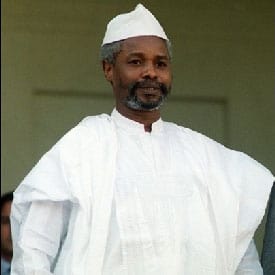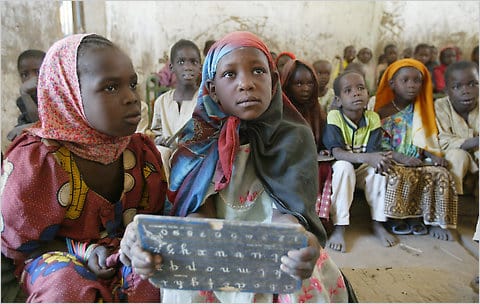The Republic of Chad’s Motto: “Unité, Travail, Progrès” (“Unity, Work, Progress”)
On August 11, 1960, Chad gained its independence from France. It is written that “France conquered the territory by 1920 and incorporated it as part of French Equatorial Africa.”
With Chad’s motto, I am proud to celebrate that unity among Chadians because my people truly respect one another’s different religious beliefs. More than 50 percent of people in Chad are Muslims and about 35 percent are Christians; these different religious groups do coexist in peace and for that we are grateful.
RELATED: Chad Achieves Independence From France On This Day In 1960
The first president of Chad was François Tombalbaye (pictured) who was also known as “N’Garta Tombalbaye” from 1973 until his death. He was a teacher and a trade union activist who served as the first president of Chad.

The head of Chad’s colonial government and its ruling party (the Chadian Progressive Party) after 1959, Tombalbaye was appointed the nation’s head of government after its independence on August 11, 1960.
He ruled as a dictator until his deposition and assassination by members of the Chadian military in 1975.
As a Chadian who knows the intimate details of the history of my country, allow me to explain Tombalbaye’s name change.
In 1973, N’Garta went through a phase of extreme nationalism, where he instituted a mandatory system of “initiation” for those who wanted to be part of his government.

Initiations in Chad are a set of mystical and traditional rituals to confirm the transition to “manhood” that sometimes causes death due to the harsh physical pain inflicted as in the cutting of one’s face. In addition, any teenager and adult in the country at that time was also forced to be initiated.
N’Garta’s oppressive acts during his rule are further explained here:
Christianity was disparaged, missionaries were expelled, and all non-Muslim males in the South between the ages of and 50 were required to undergo traditional initiation rites known as “yondo” in order to gain promotion in the civil service and the military.
These rites, however, were native to only one of Chad’s ethnic groups, Tombalbaye’s own Sara people, and even then, only to a subgroup of that people. To everyone else, the rituals were harsh and foreign.
Tombalbaye’s Africanization program failed to account for the large population in the North and center of the country, who were Muslim and did not identify with the Christian and animist South. The Gorane saw independence as a shift of control from French colonials to the south.
On November 1, 1965, riots in Guéra Prefecture led to 500 deaths. This sparked a series of disturbances throughout the north and center of the country, compounded by involvement by Chad’s neighbors, Libya to the north and Sudan to the east. The most prominent movement in this period was the FROLINAT, or ‘National Liberation Front of Chad’, based in Sudan.
Though FROLINAT was plagued by rivalry and division, it was able to resist Tombalbaye’s authoritarianism. Tombalbaye called upon France, Chad’s former colonial power, for assistance, citing treaties two countries had signed at independence.
France agreed to enter the fray, provided that Tombalbaye initiate a series of reforms to the army, government, and civil service. Taxes and laws imposed arbitrarily by Tombalbaye were to be rescinded, and the country’s traditional sultans had their role as tax collectors restored, for which they received 10% of the income.
He agreed to France’s terms in 1969 and Chad embarked on a gradual liberalization process. In elections in 1969, several hundred political prisoners were released from prison, but Tombalbaye was still the only candidate on the ballot.”
All these deep issues, which really took place early on in the Republic of Chad, allowed Hissène  Habré (pictured) to take over as President:
Habré (pictured) to take over as President:
On 29 August 1978, Habré was given the post of prime minister of Chad, replacing Félix Malloum in that position; Malloum had been both prime minister and president since 1975. Habré’s term as prime minister ended, however, a year later, when Malloum’s government ended. Elections brought Goukouni Oueddei to the presidency.
Habré deposed Oueddei in a coup on 7 June 1982, and the FAN leader became president; the post of prime minister was abolished. There followed a period of turmoil.
Yet in December 1990, Habré himself was supplanted after a coup by General Idriss Déby Itno (pictured) who has been President since then.
Unity, work, and progress need to be the words that keep pushing Chadians to want to see a truly evolved republic such as Chad.
Being that petroleum has been the driving economic force since 2000, it is time for the country to work on her economic independence and truly make sure that each and every Chadian can access clean water, the best education, employment, and all the basic necessities that every human being is entitled to.
We have witnessed our country at her lowest levels when the people we have entrusted to lead us did not keep their promises and have instead moved us backward.
It is really time for the Republic of Chad to wake up, rise up, and be the superpower it ought to be in the heart of Africa. Each and every Chadian man, woman, and child deserves a promising future and peaceful present.
Happy 55th to the Republic of Chad.
SEE ALSO: Obama: 50 Years After Voting Rights Act, We Still Have Work To Do











